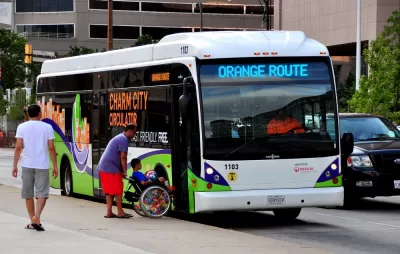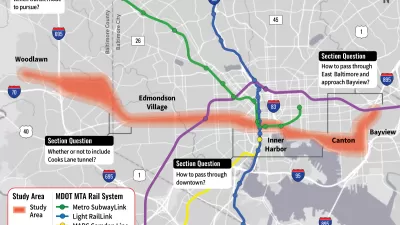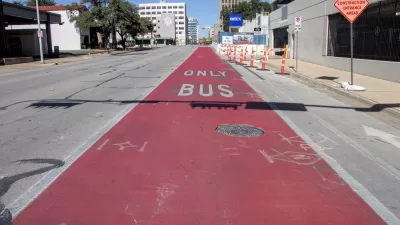A funding formula that frequently determines the scope and quality of transit in the state of Maryland could be reformed by state legislators this year.

Brian O'Malley reports on legislation in Maryland that would change the funding formula for transit everywhere in the state.
Currently, Maryland transit systems are handcuffed by a requirement that all transit systems pay for at least 35 percent of its operating budget with rider fares—the farebox recovery mandate, to use the technical term. The state's farebox recovery affects "Maryland Transit Administration (MTA) products, like MTA local (aka Baltimore’s bus service) and commuter buses (which primarily serve the District), the three MARC commuter lines, and Baltimore’s Light Rail and Metro subway lines," according to O'Malley.
"The result of complying with this mandate is that MTA regularly has no choice but to refrain from investing in services and maintenance even if those things would grow ridership and revenues over time," according to O'Malley. "In public meetings, MTA officials often cite the farebox recovery mandate as a limiting factor when responding to requests to provide service to growing employment sites or other destinations, like a new Amazon warehouse distribution facility in Baltimore."
In response, two bills are moving through the Maryland State Legislature. House of Delegates Bill 271 and Senate Bill 484 have both passed through committee, with "broad support among central Maryland transit advocates, business leaders and riders," according to O'Malley.
FULL STORY: How Maryland handcuffs its transit system, and how that could change

Alabama: Trump Terminates Settlements for Black Communities Harmed By Raw Sewage
Trump deemed the landmark civil rights agreement “illegal DEI and environmental justice policy.”

Study: Maui’s Plan to Convert Vacation Rentals to Long-Term Housing Could Cause Nearly $1 Billion Economic Loss
The plan would reduce visitor accommodation by 25% resulting in 1,900 jobs lost.

Planetizen Federal Action Tracker
A weekly monitor of how Trump’s orders and actions are impacting planners and planning in America.

Wind Energy on the Rise Despite Federal Policy Reversal
The Trump administration is revoking federal support for renewable energy, but demand for new projects continues unabated.

Passengers Flock to Caltrain After Electrification
The new electric trains are running faster and more reliably, leading to strong ridership growth on the Bay Area rail system.

Texas Churches Rally Behind ‘Yes in God’s Back Yard’ Legislation
Religious leaders want the state to reduce zoning regulations to streamline leasing church-owned land to housing developers.
Urban Design for Planners 1: Software Tools
This six-course series explores essential urban design concepts using open source software and equips planners with the tools they need to participate fully in the urban design process.
Planning for Universal Design
Learn the tools for implementing Universal Design in planning regulations.
Caltrans
Smith Gee Studio
Institute for Housing and Urban Development Studies (IHS)
City of Grandview
Harvard GSD Executive Education
Toledo-Lucas County Plan Commissions
Salt Lake City
NYU Wagner Graduate School of Public Service





























